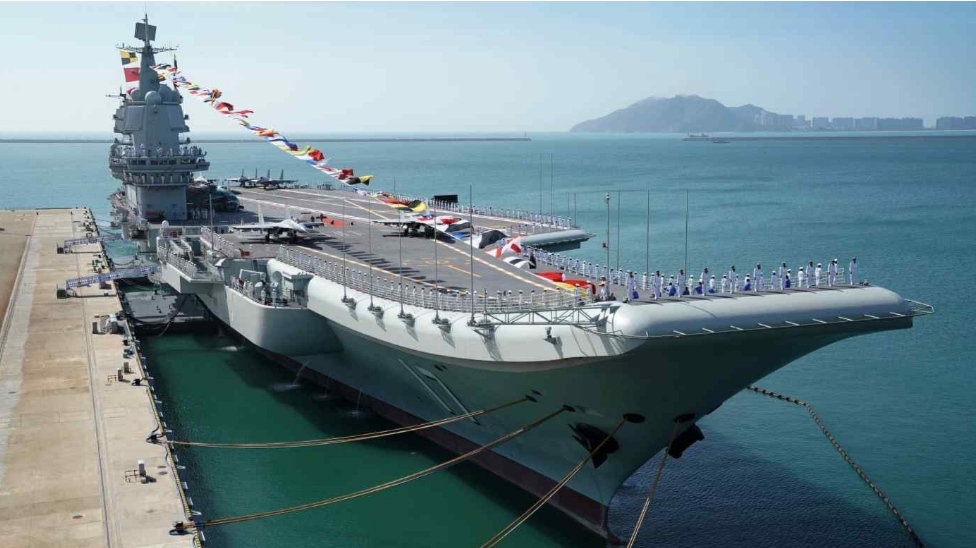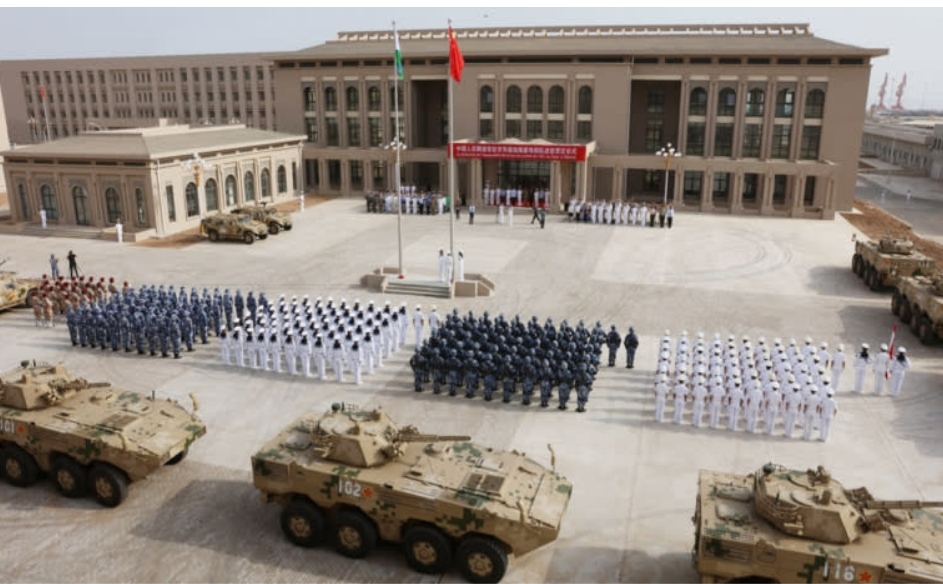China’s military buildup shows its ambitions go well beyond Taiwan

By
Elkridge Colby
No one should believe that Beijing would be sated with the takeover of the island
The Shandong, China’s first fully homebuilt aircraft carrier, in Sanya in 2019: Large carriers are a quintessential element of a blue-water navy.
Elbridge Colby is co-founder and principal at The Marathon Initiative, a strategic think tank based in Washington. He previously served as U.S. deputy assistant secretary of defence for strategy and force development and is the author of “The Strategy of Denial: American Defence in an Age of Great Power Conflict.”
There is a great deal of focus these days on whether the U.S. and key allies such as Japan and Australia should commit to defending Taiwan if China attacks it. Many are wondering whether it would not be easier, and safer, just to cut off Taiwan. It is, after all, a small island that sits close to China and far from America.
But the U.S., Japan and their allies cannot prudently expect that China would be satiated if they were to abandon Taiwan. Rather, we should acknowledge that China’s ambitions reach far beyond the island.
How can we tell? The expansive and aggressive rhetoric coming from Beijing is one indicator, as is the personality of Chinese leader Xi Jinping. But the most compelling reason to worry that Beijing’s ambitions go well past Taiwan is how China is building up its armed forces and its military footprint abroad.
A state’s development of its military is perhaps the most reliable indicator of its future behavior in the international security arena. Fundamentally, this is because developing significant military forces is expensive, requires years of planning and careful implementation, is a top-down, state-led endeavor and can produce very different kinds of militaries.
Thus, the military a state produces is, as a Marxist might say, no accident. It is a costly signal of what a state wants to be able to do.
Military force development is more revealing than diplomatic statements. Those official positions are easily changed and of course states — especially those with revisionist aims — have potent incentives to dissimulate.
Moreover, even if a particular leader undertakes a military buildup with more limited goals, his or her successors may decide to do more with what the previous leadership built.
Colin Powell, who played a key role in the U.S. military buildup under President Ronald Reagan, was the father of the “Powell Doctrine” of military restraint. But as U.S. secretary of state under Bill Clinton, Madeleine Albright famously took the country’s reinvigorated military and used it for far more expansive ends than Powell intended.
The upshot of this is that it is reasonable to infer what a state will seek to do in the future based on the development of its military. In this light, the military China is building is clearly designed for projecting dominating power well beyond Taiwan.
There really is no question of this. The military forces Beijing is constructing are manifestly designed for distant power projection, not solely for flexing muscles in China’s neighborhood, let alone mere territorial defence.
Beijing is developing nuclear-powered submarines and large aircraft carriers. These are the quintessential elements of a blue-water navy able, like the U.S. Navy, to project decisive power not just in near seas but far and wide beyond them.
China is also developing an impressively extensive space architecture. A network of satellites enables a country to operate effectively over great distances, not limited by the curvature of the earth. It is therefore a clear tell that a country wants to operate at great range.
Nor does the list end there. China is developing long-range aircraft and the refueling tankers to sustain their operations, a stronger marine corps and the rest of the appurtenances of a long-range military. These are the military features of a state that wants to be able to project decisive power throughout Asia and beyond. Indeed, Beijing itself openly says it wants such a military.

People’s Liberation Army personnel at the opening ceremony of China’s first overseas military base in August 2017 in Djibouti.
Nor is the evidence confined to force development. China is also actively pursuing the establishment of military bases far beyond its shores. Such outposts are necessary for a country to sustain a power-projecting military.
A list of where Beijing is pursuing or exploring bases, according to the U.S. government, includes South China Sea islands; Cambodia, Myanmar, Thailand and Indonesia in Southeast Asia; Djibouti, the United Arab Emirates, Pakistan, Kenya, Sri Lanka, the Seychelles and Tanzania in the Indian Ocean area; the Solomon Islands and Vanuatu in the South Pacific; and even Equatorial Guinea and Angola on the Atlantic coast of Africa.
The only other country that has such an expansive military footprint is the U.S., with its global military and commitments.
In light of this, let us return to the starting point: If Washington, Tokyo and their allies abandon Taiwan, can we expect Beijing to stop with the conquest of the island?
Any reasonable assessment of Xi’s personality and China’s own stated goals to become the world’s preeminent power suggest not. But the piece of the puzzle that really should worry us is that China will increasingly have the military to go far beyond Taiwan. As a matter of pure logic, this does not strictly mean they will, but that is the only prudent bet.
The upshot of this is that Washington, Tokyo and their allies should be prepared to defend Taiwan, with the goal of deterring Beijing from attacking by demonstrating that its efforts to subordinate the island would be too likely to fail.
If Beijing cannot seize the island, its forces will still be essentially constrained behind the island chain formed by the Japanese archipelago, Taiwan and the Philippines. In this context, Beijing will be compelled to negotiate the terms of its further rise on grounds tolerable to the rest of us.
The critical predicate for this approach, however, is that we can indeed effectively defend Taiwan and do so at a reasonable cost. Yet none of us is moving fast or resolutely enough to match China’s own breathtaking military buildup.
While there is much more talk now about the threat posed by China, and some movement afoot to address it in Japan, the U.S. and Taiwan, the fact is that the military balance continues to shift in China’s favor.
Continuing in this lassitude will only heighten the probability that Beijing will attack Taiwan. Yet we must expect that will not be the end of Beijing’s aggressive ambitions.




